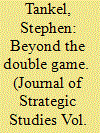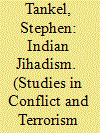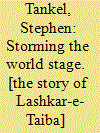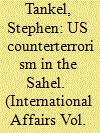|
|
|
Sort Order |
|
|
|
Items / Page
|
|
|
|
|
|
|
| Srl | Item |
| 1 |
ID:
144928


|
|
|
|
|
| Summary/Abstract |
Pakistan has a long history of patronizing militant proxies, and in recent years it has become a victim as well as a supporter of terrorism. The evolution of the jihadist insurgency in Pakistan's Federally-Administered Tribal Areas (FATA) and neighboring Khyber Pakhtunkhwa, the Pashtun militants leading it, efforts to counter the insurgency, and the overall strategic threats to the state have merited significant study. With some notable exceptions, less attention has been paid to the role Punjabi militant organizations and their splinters have played in bringing the insurgency to Pakistan's heartland. The involvement of these actors in the revolutionary jihad against the state gives the FATA-based actors leading this insurgency power projection capabilities throughout the country. This article helps to fill that knowledge gap by bringing a more detailed level of analysis to the understanding of how anti-state Punjabi militant networks function at the macro-, meso-, and micro-levels. In doing so, it illustrates that the introduction of new loci of jihad at the macro-level, simultaneous integration and atomization among militant groups at the meso-level, and greater portability of fighters at the micro-level impedes covert control by Pakistani intelligence services and decreases the utility of even sincere counterterrorism efforts by the Pakistani state.
|
|
|
|
|
|
|
|
|
|
|
|
|
|
|
|
| 2 |
ID:
159378


|
|
|
|
|
| Summary/Abstract |
States commonly take one of three approaches to militant groups on their soil: collaboration; benign neglect; or belligerence. All three approaches are present in Pakistan, where some groups also move back and forth among these categories. I employ the term “coopetition” to capture this fluidity. The dynamic nature of militancy in Pakistan makes the country an excellent laboratory for exploring a state’s assessment of the utility an Islamist militant group offers, and the threat it poses relative to other threats informs the state’s treatment of that group. In this article, I put forward a typology that situates Islamist militants in Pakistan in one of the above four categories. I also illustrate how a group’s identity, objectives, and alliances inform assessments of its utility and threat relative to other threats. In addition to enhancing our understanding of militant–state dynamics, this taxonomy builds on and helps to unify earlier typologies of Pakistani militancy.
|
|
|
|
|
|
|
|
|
|
|
|
|
|
|
|
| 3 |
ID:
150977


|
|
|
|
|
| Summary/Abstract |
In May 2016, the United States killed Afghan Taliban leader Mullah Akhtar Mohammad Mansour in the first drone strike ever in Pakistan's Baluchistan province. The Taliban has long used Baluchistan as a sanctuary, with top Taliban leaders based in the provincial capital of Quetta. Although Pakistan allowed drone strikes in the Federally Administered Tribal Areas (FATA), it did not permit them in Baluchistan. Since repairing relations after they cratered in 2011—following the May raid that eliminated Osama bin Laden, as well as a November border skirmish in which U.S.-led NATO forces operating in Afghanistan killed 24 Pakistani soldiers—U.S. and Pakistani officials have repeatedly claimed the bilateral relationship was on solid footing. The 2016 drone strike exploded this fiction.
|
|
|
|
|
|
|
|
|
|
|
|
|
|
|
|
| 4 |
ID:
132879


|
|
|
|
|
| Publication |
2014.
|
| Summary/Abstract |
India has been confronting jihadist violence for decades. Although expeditionary terrorism by Pakistani militants typically receives the most focus, indigenous actors, many benefitting from Pakistani support, are responsible for the majority of jihadist attacks in India. Yet the dynamics of Indian jihadism remain under-explored. This article examines the Indian Mujahideen (IM), which constitutes the primary indigenous jihadist threat. It argues the IM is best understood as a label for a network of modules, with a loose leadership, that is connected to smaller, self-organizing clusters of would-be militants as well as to foreign militant groups like the Pakistani Lashkar-e-Taiba.
|
|
|
|
|
|
|
|
|
|
|
|
|
|
|
|
| 5 |
ID:
108076


|
|
|
|
|
| Publication |
London, Hurst and Company, 2011.
|
| Description |
xi, 352p.
|
| Standard Number |
97801849040464, hbk
|
|
|
|
|
|
|
|
|
|
|
|
Copies: C:1/I:0,R:0,Q:0
Circulation
| Accession# | Call# | Current Location | Status | Policy | Location |
| 056350 | 363.325095491/TAN 056350 | Main | On Shelf | General | |
|
|
|
|
| 6 |
ID:
114050


|
|
|
|
|
| Publication |
India, Hachette, 2011.
|
| Description |
xi, 352p.Hbk
|
| Standard Number |
9789350092729
|
|
|
|
|
|
|
|
|
|
|
|
Copies: C:1/I:0,R:0,Q:0
Circulation
| Accession# | Call# | Current Location | Status | Policy | Location |
| 056721 | 363.325095491/TAN 056721 | Main | On Shelf | General | |
|
|
|
|
| 7 |
ID:
166664


|
|
|
|
|
| Summary/Abstract |
Why did the Islamic State of Iraq and al-Sham (ISIS) and Jabhat al-Nusra (JN)—two groups that shared similar ideological preferences and were both initially part of the Al Qaeda network—take different paths in the Syrian conflict? Part of the answer lies in the fact that JN is primarily a Syrian organization, whereas Iraqis lead ISIS. A jihadist group’s relationship to its country of origin and domicile (the two are not always the same) helps to explain that organization’s ideological preferences and alliance behavior. Yet no method of categorization based on jihadist-state relations exists. I fill this gap by theorizing an explanatory typology based on a jihadist group’s relationship with its country of origin and/or domicile. This typology consists of two tiers. The first classifies jihadist organizations based on whether they are nationally homogeneous or heterogeneous, and whether they are based in their country of origin, exile, or multiple locations. The second tier categorizes groups based on the nature of their engagement—collaborative, belligerent, or neutral—with a state. This new typology enables the generation of multiple hypotheses and has practical implications given that most U.S. counterterrorism efforts require cooperation from partner nations.
|
|
|
|
|
|
|
|
|
|
|
|
|
|
|
|
| 8 |
ID:
172870


|
|
|
|
|
| Summary/Abstract |
The massive expansion and evolution of United States security cooperation under the auspices of the ‘war on terror’ remains overlooked in the counterterrorism and interventions literature. The Sahel provides a useful region in which to explore the constitutive effects of such cooperation and its evolution because the US has always pursued an ‘economy of force’ mission there. In this article, I focus mainly on the constitutive effects of US indirect military intervention in the Sahel after 9/11, and subsequent more direct military intervention following the outbreak of civil war in Mali. The indirect intervention by the United States to build the capacity of local forces in Mali, where jihadists were based, failed because of the dissonant relationship between the two countries. This led the United States to intervene more directly in the region, including through its cooperation with and support for French and Nigerien forces. The nature of this more direct military intervention was also informed by evolving US experiences working by, with and through partner forces in other parts of the world.
|
|
|
|
|
|
|
|
|
|
|
|
|
|
|
|
|
|
|
|
|